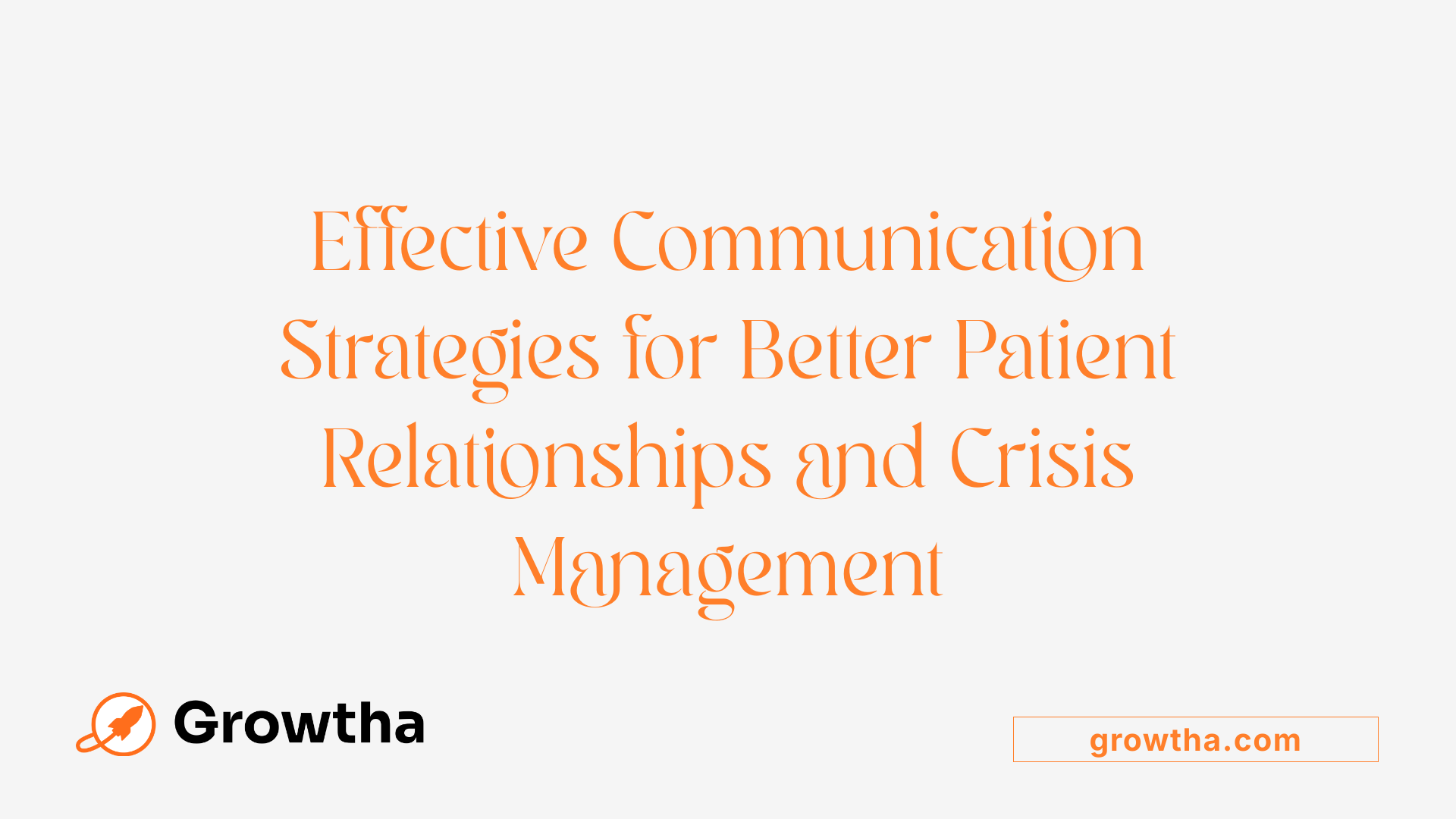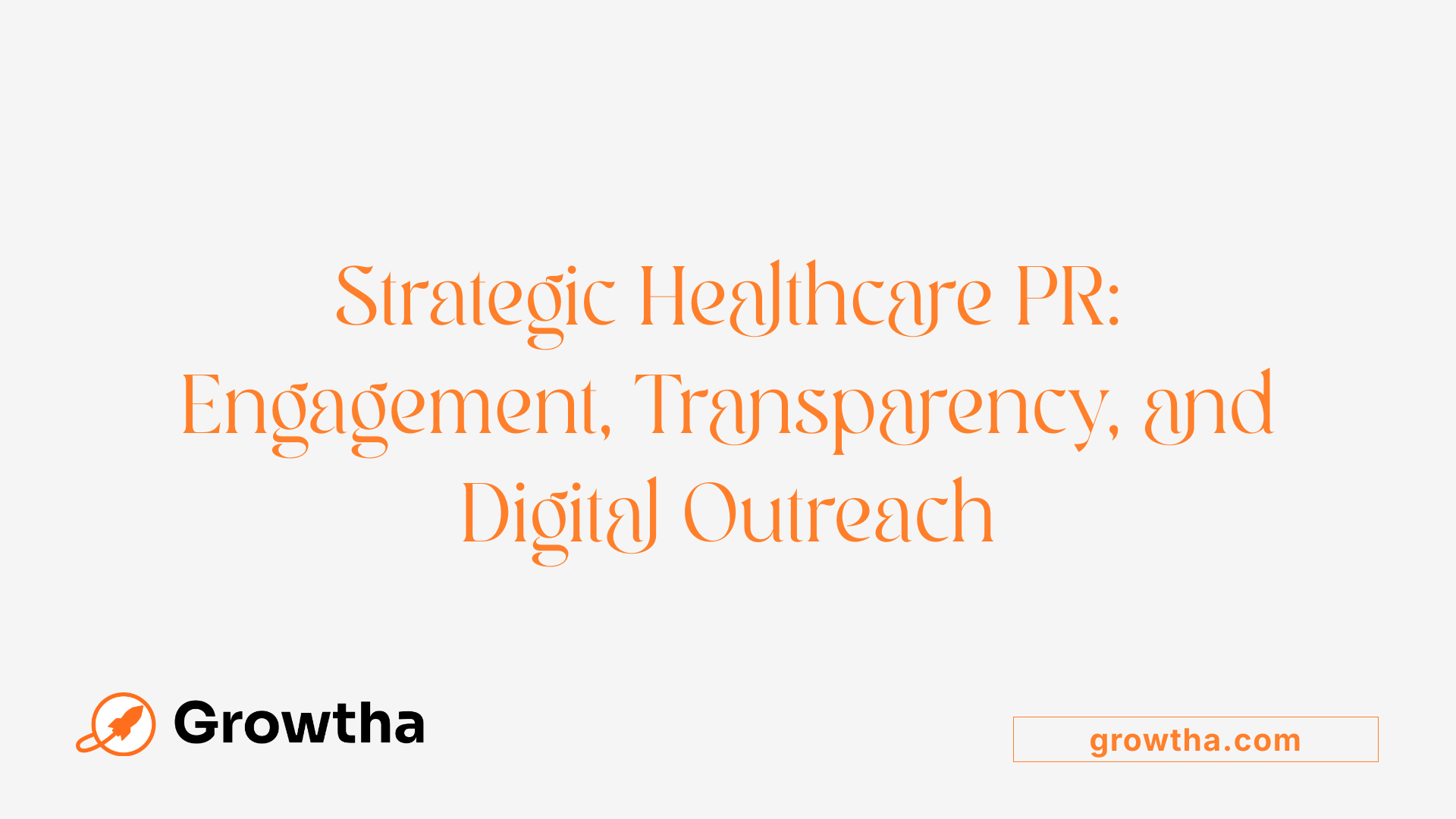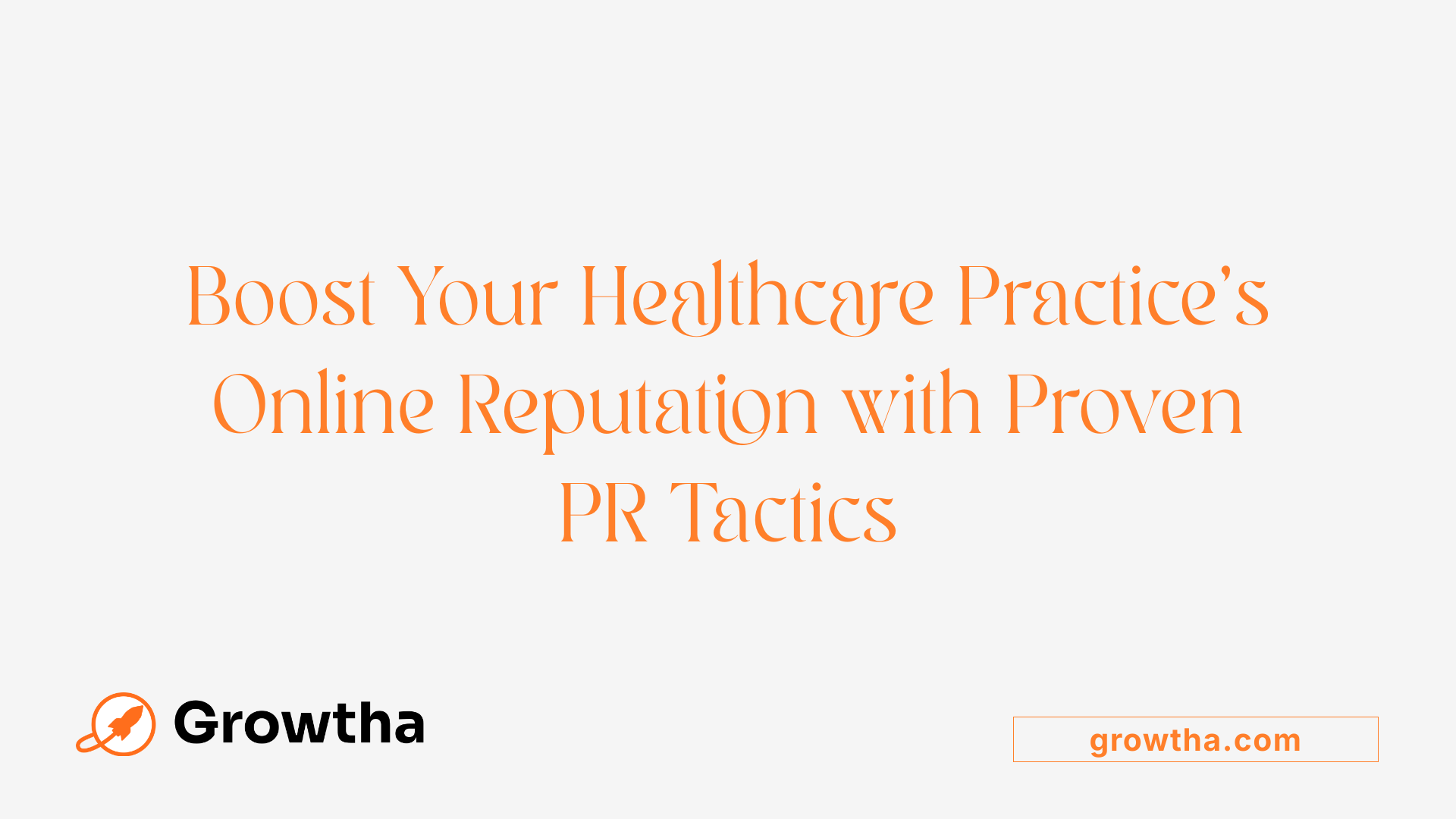Best PR Strategies for Healthcare SEO
Maximizing Healthcare Visibility: Strategic PR and SEO Synergy


Best PR Strategies for Healthcare SEO
Unlocking the Power of Healthcare Public Relations and SEO
In the rapidly evolving digital healthcare landscape, blending effective public relations (PR) strategies with robust Search Engine Optimization (SEO) practices is essential for healthcare organizations seeking to improve their online presence, build trust, and enhance reputation. This article explores best practices, innovative tactics, and strategic integrations that can elevate a healthcare provider’s visibility and foster long-term community engagement.
The Significance of Healthcare Public Relations in the Digital Age

What is the significance of healthcare public relations (PR) for healthcare organizations?
Healthcare public relations (PR) plays a vital role in shaping how the public perceives healthcare providers and organizations. It helps in building trust and establishing credibility by ensuring transparent and honest communication.
In today’s digital era, effective healthcare PR utilizes a blend of traditional and digital channels to reach broad and targeted audiences. Traditional media, like newspapers and TV, help in community outreach, while social media, websites, and blogs allow for real-time engagement and dissemination of informational content.
Strategic healthcare PR campaigns promote awareness about services, highlight organizational achievements, and respond to public concerns. They also play a critical part in crisis communication, swiftly addressing misinformation and managing reputation during challenging times.
Building trust through well-crafted narratives, sharing patient success stories, and providing health education fosters a stronger relationship between healthcare providers and the community.
Community involvement is another aspect where healthcare PR shines by encouraging health literacy and empowering individuals with knowledge about wellness and disease prevention.
In summary, healthcare PR is essential for guiding public health narratives, strengthening organizational reputation, and ultimately improving health outcomes. It ensures healthcare organizations stay relevant, credible, and connected with the populations they serve, fostering a healthier community overall.
Developing Effective Healthcare PR Strategies

What are effective public relations strategies for healthcare organizations?
Successful healthcare PR relies on a mix of proactive engagement, transparent communication, and targeted messaging. Healthcare organizations should actively reach out to media outlets and community groups to build trust and establish credibility. Sharing clear, accessible information about healthcare services and medical advancements helps demystify complex topics for the public.
Storytelling plays a vital role. Highlighting patient experiences and success stories fosters emotional connections and humanizes the organization. During health crises, educational campaigns keep the community informed and reduce misinformation.
Utilizing digital channels enhances outreach. Social media, content marketing, SEO, and paid advertising allow healthcare providers to connect with diverse audiences efficiently. Personalizing communication through reviews, newsletters, and direct engagement strengthens relationships with patients and providers.
Data-driven strategies and honest messaging are essential for managing reputation and responding effectively during crises. Ethical communication and adherence to privacy regulations foster trust. Overall, combining strategic media relations, content creation, community involvement, and responsive crisis management forms the foundation of robust healthcare PR approaches.
Enhancing Healthcare Online Visibility and Reputation

How can healthcare organizations enhance their online visibility and reputation through public relations?
Healthcare organizations can significantly improve their online presence and overall reputation by implementing strategic public relations (PR) practices. A fundamental step involves actively monitoring and managing patient feedback across various review platforms like Google, WebMD, and Healthgrades. Using specialized tools such as Press Ganey, RepuGen, or Relias enables organizations to keep a close eye on patient sentiments and online mentions.
Harnessing sentiment analysis and natural language processing (NLP) technologies allows providers to understand the emotional tone of reviews and comments automatically. This insight helps them address patient concerns swiftly and appropriately, particularly negative feedback, turning potential reputation risks into opportunities for improvement.
Claimed and optimized online listings are crucial. Providers should ensure that their profiles on platforms like Google My Business, Yelp, and healthcare review sites are complete, up-to-date, and contain accurate information about services, practitioners, and contact details. Creating rich, informative content—such as detailed practitioner bios, service pages, and healthcare tips—enhances visibility and patient engagement.
Encouraging satisfied patients to leave positive reviews is another effective strategy. Automated prompts and follow-up emails after appointments can motivate patients to share their experiences. Authentic, positive reviews not only improve search ranking but also build trust with prospective patients.
Transparency and timely responsiveness in online communication are essential for establishing credibility. Healthcare providers should promptly reply to reviews, thank patients for positive feedback, and address negative comments professionally and empathetically. This openness demonstrates accountability and commitment to patient care.
By leveraging data-driven insights alongside real-time monitoring, healthcare organizations can bolster their reputation, attract new patients, and ultimately enhance practice revenue. Consistent efforts in reputation management through PR strategies create a trustworthy online persona, which is vital in today’s digital-first healthcare landscape.
For more detailed strategies, searching "healthcare reputation management strategies online" can provide additional targeted insights into building and maintaining a positive healthcare reputation.
Integrating SEO with Healthcare Public Relations
How can Search Engine Optimization (SEO) be integrated with healthcare public relations to improve online presence?
Combining SEO with healthcare PR is vital for building a robust online reputation and increasing visibility. It starts with developing cohesive content strategies that blend relevant keywords with compelling storytelling and data-driven narratives. These stories not only engage audiences but also rank well in search engines.
Healthcare PR can enhance SEO efforts by creating newsworthy stories and managing media outreach. Press releases, interviews, and success stories distributed across various channels help generate backlinks and improve search engine rankings. Additionally, encouraging positive patient reviews and user-generated content on review sites and social media boosts credibility and local search presence.
Collaboration between SEO and PR teams from the beginning of content creation—such as press releases, blogs, and website content—ensures optimization is embedded naturally. This collaboration helps incorporate target keywords, optimize meta tags, and improve technical aspects like site speed and mobile-friendliness.
Focusing on local SEO is especially important for healthcare providers. Optimizing Google Business Profiles, using location-specific keywords, and maintaining consistent NAP (Name, Address, Phone Number) information helps attract local patients.
Regular analysis using tools like Google Analytics, Search Console, and Ahrefs allows teams to monitor performance, refine keywords, and adapt strategies to changing trends. Overall, integrating SEO with healthcare PR ensures a sustained online presence, fosters trust, manages reputation, and attracts new patients effectively.
Content Marketing, Keyword Research, and Link Building for Healthcare SEO
What are best practices for content marketing, keyword research, and link building in healthcare SEO campaigns?
Executing a successful healthcare SEO strategy requires a multi-faceted approach centered around thorough keyword research, high-quality content creation, and strategic link building.
Begin by performing comprehensive keyword research to identify terms with high search volume, relevance to patient needs, and low competition. Leveraging tools such as Google Keyword Planner and Google Search Console helps uncover keywords that align with search intent, including long-tail, service-specific, and symptom-based queries.
Creating authoritative content is vital for demonstrating expertise and building trust. Effective content includes detailed blog articles, FAQs, videos, infographics, and podcasts tailored to patient questions and challenges. Emphasizing accuracy, citations, and verified information adheres to Google’s E-E-A-T principles—Experience, Expertise, Authority, and Trustworthiness.
Optimizing technical SEO aspects is equally important. Ensuring your website loads quickly, is mobile-friendly, secure with HTTPS, and accessible to all users enhances user experience and search rankings. Implementing schema markup for hospitals, doctors, and treatments improves visibility in rich results.
Local SEO strategies focus on optimizing your Google My Business profile, managing patient reviews, building local citations, and including geographical keywords. These tactics increase your clinic’s visibility within local searches.
Backlink building from reputable healthcare sources strengthens your site’s domain authority. Earning backlinks through guest posts, collaborations with medical professionals, and engagement in community directories signals credibility to search engines.
Finally, continuously monitor your SEO performance using tools like Google Analytics, Search Console, and Ahrefs. Analyzing organic traffic, keyword positioning, bounce rates, and conversions allows you to refine your strategies effectively.
Integrating content marketing with social media, email campaigns, and paid advertising broadens your reach and reinforces your authority.
Overall, a balanced focus on targeted keyword research, quality content, technical health, local optimization, and authoritative backlinks forms the foundation for successful healthcare SEO efforts.
Improving Healthcare Practice Visibility via Public Relations
What strategies can be employed to improve the online presence of healthcare practices through public relations?
To enhance their online visibility, healthcare practices should adopt a comprehensive PR approach that combines various tactics tailored to their goals. One of the most effective strategies involves actively managing online reviews. Healthcare providers should encourage satisfied patients to leave reviews on popular platforms like Google, Yelp, and Healthgrades. Responding professionally and promptly to both positive and negative feedback shows commitment to patient care and builds trust.
Patient engagement plays a crucial role. Staff training on eliciting feedback, implementing automated follow-up emails, and conducting satisfaction surveys help gather genuine reviews and insights. These reviews not only bolster reputation but also improve search engine rankings.
Sharing high-quality, informative content is another vital tactic. Regularly posting blogs, videos, and patient testimonials on social media channels and the practice’s website establishes authority and attracts prospective patients. Content should reflect the practice’s mission and provide real value, such as health tips or success stories.
Optimizing online profiles and local search presence is essential. This involves ensuring that information on Google My Business, local directories, and review sites is accurate, complete, and consistent. Incorporating relevant keywords and local identifiers enhances visibility in local search results.
Media outreach and securing press coverage can boost reputation and awareness. Press releases about new services, awards, or community involvement help position the practice as a trusted healthcare provider and generate media interest.
Monitoring online reputation is an ongoing process. Healthcare practices should regularly check review sites and social media mentions, analyze patient feedback, and adjust their strategies accordingly. Engaging with patients through these channels not only improves public image but also fosters stronger relationships.
Finally, considering professional reputation management services can provide expert support in maintaining a positive online presence. Combining review management, content marketing, local SEO, and media outreach forms a balanced, effective public relations strategy that elevates healthcare practices in today’s competitive digital landscape.
The Future of Healthcare PR and SEO: Trends and Technologies
What future trends should healthcare organizations prepare for in healthcare PR and SEO?
Healthcare organizations need to anticipate several upcoming trends that will shape their communication and digital marketing strategies. One significant shift involves heightened compliance with HIPAA and increased emphasis on data privacy. As patient information becomes more protected, organizations must implement secure methods for communication and data management to adhere to legal standards.
The competition within healthcare search results is also expected to intensify. To stand out, providers will need to continuously refine their SEO tactics, produce innovative, high-quality content, and leverage emerging technologies to increase visibility.
Artificial intelligence (AI) will play an increasingly influential role. From content creation to search algorithms, AI can help deliver personalized, targeted messaging that resonates with individual patient needs. This personalization can improve engagement and trust.
Organizations must develop flexible strategies to adapt to rapid technological innovations and changing patient expectations. Incorporating voice search capabilities, chatbots, and personalized health interactions will become essential components of a modern healthcare digital marketing plan.
Staying ahead requires a proactive approach: integrating robust privacy practices, utilizing AI-driven tools, and continuously innovating content and engagement channels. Those who adapt swiftly will be better positioned to maintain trust and competitive advantage in an evolving healthcare landscape.
Enhancing Healthcare Outcomes Through Strategic PR and SEO
By integrating well-crafted public relations strategies with comprehensive healthcare SEO practices, organizations can significantly improve their online visibility, foster trust and credibility, and better serve their communities. Embracing data-driven insights, innovative content, and adaptive tactics will position healthcare providers as trusted leaders in their field. Staying ahead of emerging trends and technological changes ensures sustained engagement and reputation, ultimately leading to improved health outcomes and organizational growth in a competitive digital landscape.
References
- Expert Guide to Developing the Best Healthcare PR Strategy
- 7 Healthcare SEO Ideas & Actions To Heal Your Strategy
- Healthcare PR Strategies: A Step-by-Step Guide - Medicinal Marketing
- Healthcare SEO: Complete Industry Guide for 2025
- Healthcare SEO guide: Strategies and tactics for medical providers
- The Synergy of SEO and PR in Healthcare Communications - PMLiVE
- SEO Best Practices for Healthcare Providers: A Guide to Boosting ...
- Healthcare Content Marketing Strategy: Getting Started & Tips







